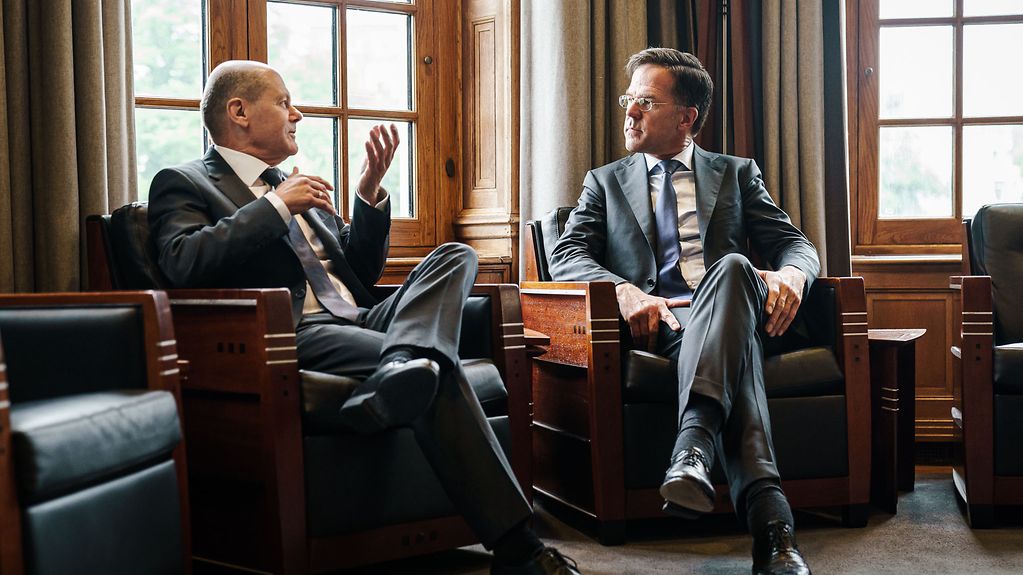The Federal Chancellor holds talks on Ukraine with the Prime Minister of the Netherlands
Russia not only bears responsibility for the impact of the war in Ukraine, but also for the risk of a severe global food crisis, said Federal Chancellor Scholz during his talks with the Dutch Prime Minister Rutte in The Hague. Prior to this, Scholz had met King Willem-Alexander.
3 min reading time

Federal Chancellor Scholz and Prime Minister Rutte: Germany and the Netherlands intend to further intensify their cooperation.
Photo: Federal Government/Denzel
“The Netherlands are an important, reliable and friendly neighbour and partner,” said Federal Chancellor Olaf Scholz following a meeting with Prime Minister Mark Rutte on Thursday. Prior to this the Federal Chancellor had an audience with King Willem-Alexander at “Huis ten Bosch” in The Hague.
Agenda defined by war
The Federal Chancellor’s visit to the Netherlands again focused on the current situation in Ukraine. Scholz praised the close and trusted partnership with the Netherlands on all issues connected with the war. “We provide financial, humanitarian and military support to Ukraine. A joint German-Dutch project has recently commenced to train Ukrainian forces in the use of the heavy artillery that our countries are making available to them,” the Federal Chancellor said.
Calls for an immediate end to the war
Scholz stressed that their position on Russia was clear: “We call on President Putin unequivocally to end the war of aggression against Ukraine, to agree to an immediate ceasefire and to withdraw his troops. The killing must end.”
Danger of famine
The Federal Chancellor made clear that, in addition to the dreadful consequences of the war for Ukraine itself, there was now the risk of a serious food crisis, particularly in the Global South.
“Let me be clear about this: Russia alone bears responsibility due to its aggression and the fact that trade routes for grain exports from Ukraine are currently blocked,” Scholz reiterated.
Deutschland initiiert internationale Hilfe
Scholz explained that Germany had taken steps to counteract the food crisis by using its current G7 Presidency to launch a Global Alliance for Food Security at the Council of Development Ministers. “This alliance is open to all who are not prepared to sit idly by while the world's poorest people have to pay the price of Russian aggression.”
Scholz also pledged to use the special meeting of the European Council in just under ten days to discuss the consequences of Russia’s invasion and further support for Ukraine.
Climate and energy: accelerating the transformation
The Federal Chancellor warned that Russia’s aggression was having an impact on climate and energy security in Europe. “Putin’s war in Ukraine is a prompt for us to push forward even faster with our joint efforts, particularly with regard to our intention to accelerate our switch to renewable energy, with regard to energy efficiency and the EU network infrastructure and hydrogen. That is the way towards a safe, clean and independent future for energy supplies.”
At the North Sea Summit in Esbjerg on Wednesday, the Federal Chancellor and Prime Minister Rutte launched an initiative with their Danish counterpart, the Belgian prime minister and the president of the European Commission to massively expand wind energy in the North Sea. “This shows that we are taking resolute steps to rapidly increase energy supplies from renewable sources and to set the course for the future,” said Federal Chancellor Scholz.
The Federal Chancellor expressed his optimism that Germany and the Netherlands would intensify their cooperation around LNG, hydrogen, wind energy and bilateral crisis prevention.
EU enlargement process: a question of credibility
The Federal Chancellor went on to say that he and Prime Minister Rutte had discussed the issue of the EU enlargement process. “Successfully integrating our partners in the Western Balkans into the EU is in the interests of the European Union and all of us. That is why it is at the very top of the Federal Government’s political agenda.”
Scholz stressed it was particularly important to energise the entry negotiations for these countries and to take steps to overcome any remaining obstacles. “It’s a question of credibility for the European Union and geostrategic good sense.”
Scholz expressed his hope that the entry negotiations with Albania and Northern Macedonia, which had been approved almost two years ago, should begin now.